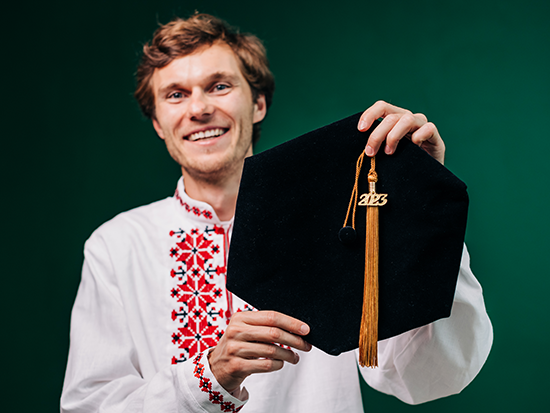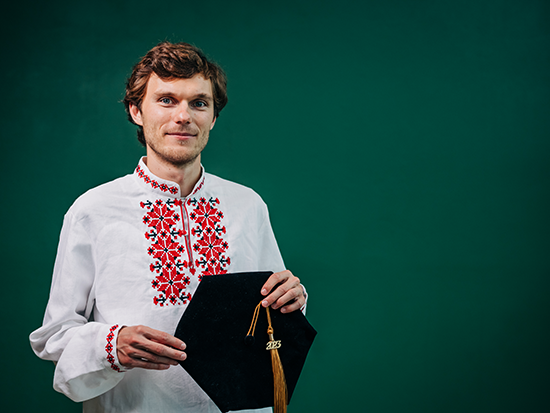 Maksim Dolmat is a 29-year-old international student who will be graduating from the University of Alabama at Birmingham with a doctorate in chemistry Aug. 11.
Maksim Dolmat is a 29-year-old international student who will be graduating from the University of Alabama at Birmingham with a doctorate in chemistry Aug. 11.
Photography: Andrea Mabry
For Ph.D. student Maksim Dolmat, coming to Birmingham, Alabama, from Belarus was a bit of a culture shock.
“From the way apartments are set up to the city infrastructure, there was truly a lot I had to process those first couple of months I was here,” the 29-year-old said.
Dolmat began the chemistry Ph.D. program at the University of Alabama at Birmingham in August of 2018. With a passion for science and to impact society, Dolmat was motivated to make his family back home in Belarus proud, even sending money consistently to help support them as he pursued this new opportunity.
With a bachelor’s degree in chemistry from Belarusian State University, Dolmat was well-versed in the laboratory environment, but not to the extent he originally thought.
“In Belarus, we have limited equipment and resources,” Dolmat said. “But with coming to UAB, I had access to equipment and technology that takes the research methods I had been accustomed to a step further.”
While his experience in the laboratory grew to exceed his initial expectations, Dolmat quickly began to realize the scope at which he could make an impact.
“In my five years of study prior to UAB, I was viewing science and research from such a box,” Dolmat said. “In my five years here at UAB, I have been granted the opportunity to understand that, not only can you make an impact with your research, but you can see the impact of it.”
Under his mentor Eugenia Kharlampieva, Ph.D., Dolmat has been able to take part in multiple UAB research projects, including the demonstration of a 100-nanometer polymersome safely and efficiently carrying PARP1 siRNA to triple-negative breast cancer tumors in mice models. . .
“Dr. Kharlampieva has been amazing throughout my Ph.D. process,” Dolmat said. “She took me on as a graduate research assistant, and I have been granted opportunities to conduct research involving polymer chemistry, nanotechnology and biomedical science.”
 Photography: Andrea MabrySince being at UAB, Dolmat has been included in a total of 13 peer-reviewed publications.
Photography: Andrea MabrySince being at UAB, Dolmat has been included in a total of 13 peer-reviewed publications.
“It’s been more than eye-opening in that I’ve been doing meaningful work here,” Dolmat said. “I’ve learned so much, and in that I’ve come to the understanding that it’s never too late to learn and make a difference.”
Dolmat is an active member of the Alabama chapter of the American Chemical Society, by which he was named the 2021 Alabama Section ACS Outstanding Graduate Student Fellow; received a Recognition of Excellence in Mentoring award from The ACS Committee on Education in 2022.
Dolmat went on to receive the Excellence in Graduate Research award from UAB in 2022 and was most recently awarded the Outstanding International Student in Chemistry award in April of 2023.
Passionate for the advocation of Ph.D. candidates and other individuals seeking higher-education opportunities, Dolmat is an active member of the fifth cohort of the American Society for Biochemistry and Molecular Biology advocacy training program. He is part of the 2023 Science Policy and Advocacy Certificate Program under the University of California, Irvine.
Dolmat is currently coordinating a career development workshop for graduate students and postdoctoral scholars sponsored by the ACS. He says, as he was originally, there are many students, international and native to the United States, who are just not aware of how broad the possibilities are.
“Many really aren’t aware of all the various avenues and opportunities that are available,” Dolmat said. “The Career Kick-Starter Workshop will present participants with information about different opportunities for the future to create a successful career path in academia, industry, government, nonprofit or entrepreneurship.”
After graduation, Dolmat will be moving to San Diego for a postdoctoral research position at the University of California, San Diego.
 Photography: Andrea Mabry“Approximately 40 percent of patients undergoing immune checkpoint inhibitor therapy experience chronic immune-related adverse events, or irAEs, which include autoimmune arthritis-like complications in about 5 percent of patients,” Dolmat said.
Photography: Andrea Mabry“Approximately 40 percent of patients undergoing immune checkpoint inhibitor therapy experience chronic immune-related adverse events, or irAEs, which include autoimmune arthritis-like complications in about 5 percent of patients,” Dolmat said.
Dolmat will be focusing on developing new nanomaterials for addressing cancer irAEs, which are a spectrum of adverse events of autoimmune or autoinflammatory origin that can affect almost any organ system.
“The project will utilize my expertise in developing nanoparticles for drug delivery and the resources available in my postdoctoral research lab, focusing on synthesizing and characterizing biomaterials to stabilize local regulatory T cells,” Dolmat said. “This approach aims to resolve arthritis-irAEs in affected joints using the SKG mouse model, which exhibits symptoms resembling human rheumatoid arthritis, making it a potentially valuable animal model for studying RA.”
Dolmat greatly acknowledges UAB for being the launching point for what he wants to achieve. Inspired to do biomedical research, Dolmat aspires to help bring new and innovative technologies from research laboratories to the patients.
“It’s all been a journey, one of personal and professional growth,” he said. “But now as I prepare to leave Birmingham and UAB, I want to reach as high as possible and make an impact on society. UAB showed me that I have the potential to do that and has further equipped me with the necessary skills and experience to do so.”
Dolmat will graduate from UAB with his doctorate in chemistry Friday, Aug. 11.